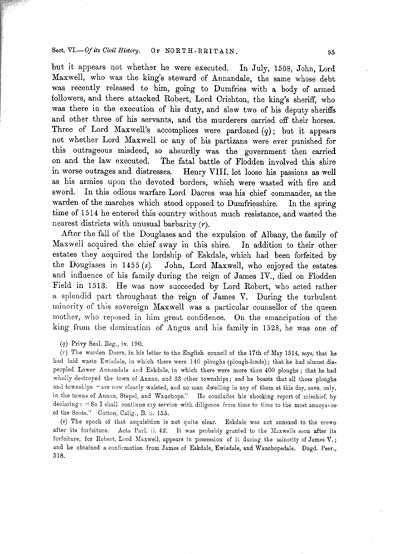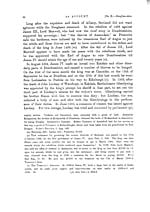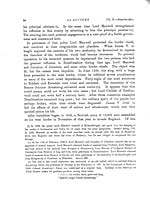Volume 5
(99) Page 93
Download files
Individual page:
Thumbnail gallery: Grid view | List view

93 but it appears not whether he were executed. In July, 1508, John, Lord Maxwell, who was the king's steward of Annandale, the same whose debt was recently released to him, going to Dumfries with a body of armed followers, and there attacked Robert, Lord Crichton, the king's sheriff, who was there in the execution of his duty, and slew two of his deputy sheriffs and other three of his servants, and the murderers carried off their horses. Three of Lord Maxwell's accomplices were pardoned (q); but it appears not whether Lord Maxwell or any of his partizans were ever punished for this outrageous misdeed, so absurdly was the government then carried on and the law executed. The fatal battle of Flodden involved this shire in worse outrages and distresses. Henry VIII. let loose his passions as well as his armies upon the devoted borders, which were wasted with fire and sword. In this odious warfare Lord Dacres was his chief commander, as the warden of the marches which stood opposed to Dumfriesshire. In the spring time of 1514 he entered this country without much resistance, and wasted the nearest districts with unusual barbarity (r). After the fall of the Douglases and the expulsion of Albany, the family of Maxwell acquired the chief sway in this shire. In addition to their other estates they acquired the lordship of Eskdale, which had been forfeited by the Douglases in 1455 (s). John, Lord Maxwell, who enjoyed the estates and influence of his family during the reign of James IV., died on Flodden Field in 1513. He was now succeeded by Lord Robert, who acted rather a splendid part throughout the reign of James V. During the turbulent minority of this sovereign Maxwell was a particular counsellor of the queen mother, who reposed in him great confidence. On the emancipation of the king from the domination of Angus and his family in 1528, he was one of (q) Privy Seal. Reg., iv. 190. (r) The warden Dacre, in his letter to the English council of the 17th of May 1514, says, that he had laid waste Ewisdale, in which there were 140 ploughs (plough-lands); that he had almost dis- peopled Lower Annandale and Eskdale, in which there were more than 400 ploughs; that he had wholly destroyed the town of Annan, and 33 other townships; and he boasts that all those ploughs and townships "are now clearly waisted, and no man dwelling in any of them at this day, save, only, in the towns of Annan, Stepel, and Wauchope." He concludes his shocking report of mischief, by declaring : " So I shall continue my service with diligence from time to time to the most annoyance of the Scots." Cotton, Calig., B. ii. 155. (s) The epoch of that acquisition is not quite clear. Eskdale was not annexed to the crown after its forfeiture. Acta Parl. ii. 42. It was probably granted to the Maxwells soon after its forfeiture, for Robert, Lord Maxwell, appears in possession of it during the minority of James V.; and he obtained a confirmation from James of Eskdale, Ewisdale, and "Wauchopedale. Dugd. Peer., 518.
Set display mode to:
![]() Universal Viewer |
Universal Viewer | ![]() Mirador |
Large image | Transcription
Mirador |
Large image | Transcription
Images and transcriptions on this page, including medium image downloads, may be used under the Creative Commons Attribution 4.0 International Licence unless otherwise stated. ![]()
| Caledonia, or, An account, historical and topographic of North Britain from the most ancient to the present times > Volume 5 > (99) Page 93 |
|---|
| Permanent URL | https://digital.nls.uk/74530322 |
|---|---|
| Description | Vol. V. |
|---|---|
| Attribution and copyright: |
|

